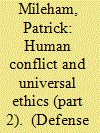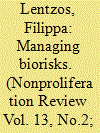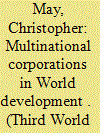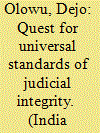|
|
|
Sort Order |
|
|
|
Items / Page
|
|
|
|
|
|
|
| Srl | Item |
| 1 |
ID:
144748


|
|
|
|
|
| Summary/Abstract |
This second part of the review article begins with a definition of military power, when and how it should be used. From a large number of authors, “moral forces” are linked to “codes of conduct”, and the fundamental understandings about the “profession of arms”, based on “fiduciary trust”, “covenanted” service and professional and personal “conscience”. The article covers what authors have written about “culture” and the ethics of “technology” devices and systems, including “cyber” warfare. It concludes with recognition of the increase in ethical sensitivity in this century which is characterized by a phenomenon, the crises of “identity”, personal, national and global.
|
|
|
|
|
|
|
|
|
|
|
|
|
|
|
|
| 2 |
ID:
075776


|
|
|
|
|
| Publication |
2006.
|
| Summary/Abstract |
The misuse of biological research is increasingly becoming a prominent policy concern. One regulatory measure that has gained considerable support over the last few years in response to this is voluntary self-governance by the scientific community, and in particular codes of conduct. This article charts the rise of the policy debate on codes, highlighting the involvement of the scientific community. Shifting the focus from policy to practice, it explores the effectiveness of codes of conduct as a regulatory measure by examining our experiences of how another voluntary self-governance regime in the biosciences has worked in practice. Noting limitations with voluntary self-governance as a regulatory tool to prevent misuse, this article includes a reflection on the attention paid to codes of conduct in policy discussions, arguing that there are at least three possible interpretations
|
|
|
|
|
|
|
|
|
|
|
|
|
|
|
|
| 3 |
ID:
154788


|
|
|
|
|
| Summary/Abstract |
In light of the 2014 Ecuador-sponsored resolution at the UN Human Rights Council to examine the link between Transnational Corporations and Human Rights, in this paper I review the first major discussion at the United Nations of the role of multinational corporations. The report on Multinational Corporations in World Development (1973) for the UN Department of Economic and Social affair launched the (then) new UN Centre on Transnational Corporations. I examine the report in some detail, compare and contrast this with the Ecuadorian resolution from 2014, and reflect on the continuities and changes in attempts to regulate the conduct of global corporations over the 40 years between these two moments.
|
|
|
|
|
|
|
|
|
|
|
|
|
|
|
|
| 4 |
ID:
120734


|
|
|
|
|
| Publication |
2013.
|
| Summary/Abstract |
While the Bangalore Principles of Judicial Conduct, 2002, are not binding on states, they evidence high-level support for the principle of judicial integrity. In addition, superior courts and judiciaries of diverse legal traditions have relied on the Bangalore Principles in codifying their minimum standards of judicial integrity. Extrapolating from some of the core values of the Bangalore Principles, this article accentuates some of the critical challenges implicated in establishing credible, independent and accountable judiciaries. Beyond the task of developing appropriate mechanisms for ensuring judicial integrity, this article assesses the follow-up efforts to the Bangalore Principles, such as the draft Lusaka Measures on the Implementation of the Bangalore Principles on Judicial Conduct, 2010, contending that while these measures seek to quantify the critical elements of the Bangalore Principles, there are still areas of concern. This article addresses a plethora of pertinent questions, advocating that the mechanisms for judicial integrity should not be entirely controlled by the judiciary but be made to accommodate sufficient lay representation, and furthermore, that current codes of judicial conduct be formulated as enforceable rules and procedures in ways that would sustain public confidence in judicial processes.
|
|
|
|
|
|
|
|
|
|
|
|
|
|
|
|
| 5 |
ID:
090901


|
|
|
|
|
| Publication |
2009.
|
| Summary/Abstract |
Private, voluntary compliance programs, promoted by global corporations and nongovernmental organizations alike, have produced only modest and uneven improvements in working conditions and labor rights in most global supply chains. Through a detailed study of a major global apparel company and its suppliers, this article argues that this compliance model rests on misguided theoretical and empirical assumptions concerning the power of multinational corporations in global supply chains, the role information (derived from factory audits) plays in shaping the behavior of key actors (e.g., global brands, transnational activist networks, suppliers, purchasing agents, etc.) in these production networks, and the appropriate incentives required to change behavior and promote improvements in labor standards in these emergent centers of global production. The authors argue that it is precisely these faulty assumptions and the way they have come to shape various labor compliance initiatives throughout the world-even more than a lack of commitment, resources, or transparency by global brands and their suppliers to these programs-that explain why this compliance-focused model of private voluntary regulation has not succeeded. In contrast, this article documents that a more commitment-oriented approach to improving labor standards coexists and, in many of the same factories, complements the traditional compliance model. This commitment-oriented approach, based on joint problem solving, information exchange, and the diffusion of best practices, is often obscured by the debates over traditional compliance programs but exists in myriad factories throughout the world and has led to sustained improvements in working conditions and labor rights at these workplaces.
|
|
|
|
|
|
|
|
|
|
|
|
|
|
|
|
|
|
|
|
|